
Menu of Outcomes Series: Six Ways Charities Are Strengthening the Animal Advocacy Movement
In our Menu of Outcomes blog series, we explore different interventions for achieving animal advocacy outcomes and highlight real-world examples from charities across the movement. Here, we look at interventions some of our recommended charities and Movement Grant recipients are using to strengthen the animal advocacy movement.
Introduction
As the world’s ever-changing environment continues to raise new threats for species, the animal advocacy movement must adapt to ensure its strength and resiliency. Ways of strengthening the animal advocacy movement include conducting research on animal suffering and the effectiveness of various interventions, sharing resources and information related to animal advocacy, and fostering inclusivity among animal advocates. These efforts help create a more informed, connected, and supportive movement that can better accomplish our shared goal of helping animals.
This post highlights some of the ways animal advocacy groups are working to strengthen the animal advocacy movement. Our goal here is not to examine or compare the effectiveness of different interventions,1 but rather to showcase the diversity of approaches animal advocates can use to achieve similar goals. We hope that the programs and interventions below inspire organizations and individuals to broaden their awareness of ways to approach their work.
Faunalytics: Leveling the Informational Playing Field
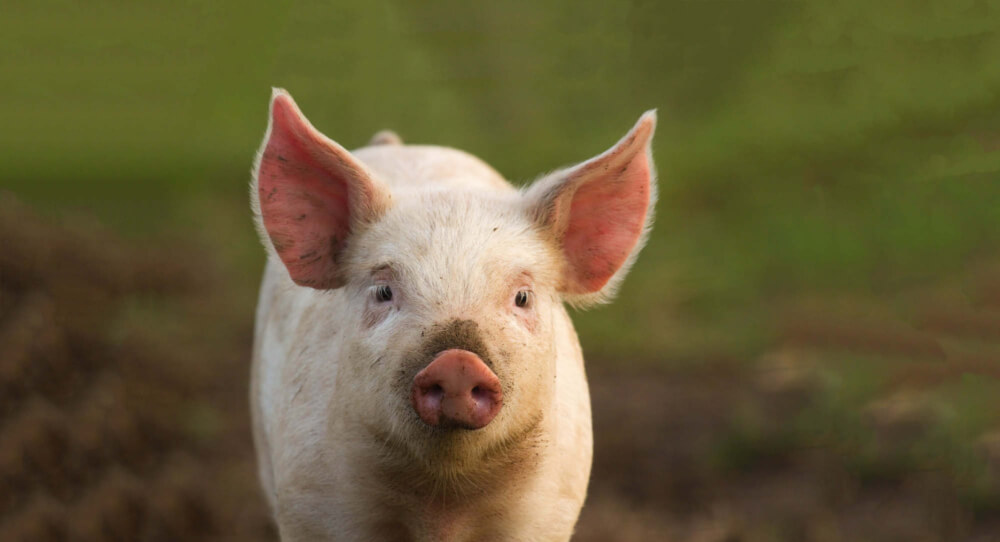
At the beginning of the 21st century, few resources existed on how to advocate for animals, let alone how to do so effectively. In 2000, a group of animal advocates seeking to enhance the impact of their efforts formed Faunalytics (then the Humane Research Council) to research and identify the best strategies for helping animals.
Twenty-three years later, Faunalytics is well-established as one of the most trusted authorities on data, discussion, and research advice in the animal advocacy movement. Their work to empower advocates with access to impactful resources earned them a Standout Charity recommendation from ACE three times in a row; in 2021, we awarded them our Top Charity status.
“The animal protection movement is full of passionate advocates working hard to make a difference for animals; but to be successful, we need to balance passion with strategy,” said Brooke Haggerty, Executive Director of Faunalytics. “Industries that exploit and harm animals spend millions of dollars on research to influence legislation and sway public opinion and behavior to their advantage. […] Faunalytics is here to level the informational playing field.”
Nearly all of Faunalytics’ programs focus on strengthening animal protection efforts. Their original research and research library offer actionable insights on a wide range of animal-related topics, and their research support program provides advocates with guidance on study design, literature review, and other skills that can help them apply research to their work. Advocates looking for one-on-one support can utilize their virtual Office Hours program.
“In order to make meaningful change, advocates must have access to timely, relevant, high-quality research that can guide their work,” said Haggerty. “In a movement severely limited by resources, our support is critical to building the capacity of the animal protection movement.”
Wild Animal Initiative: Growing the Field of Wild Animal Welfare
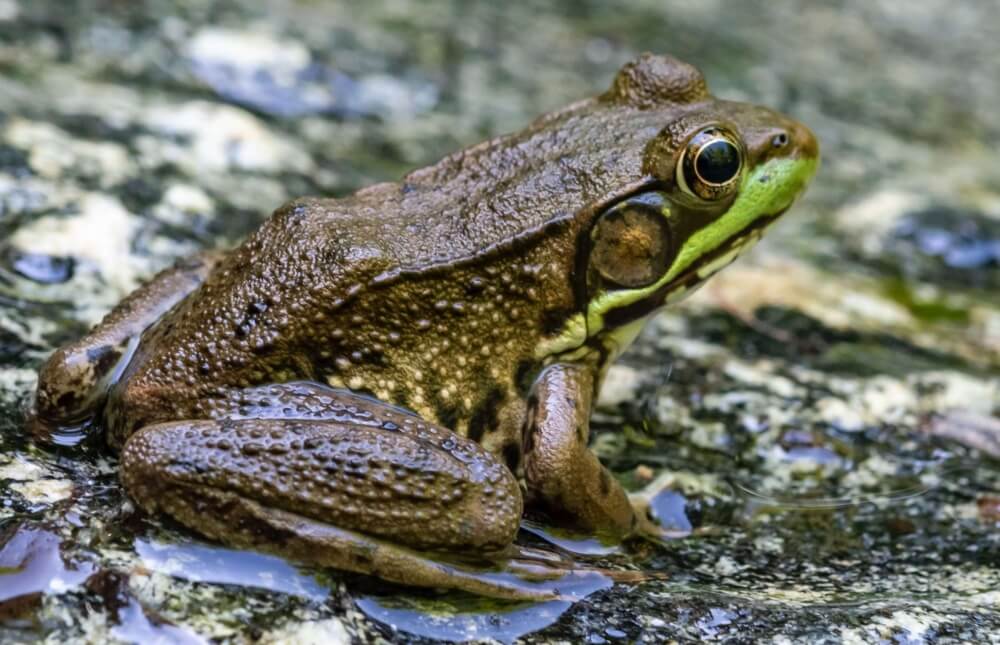
Far more animals live in the wild than in captivity, and many experience considerable suffering due to both natural and human-caused threats. Little is known about how to improve wild animal welfare—partially because it is difficult to study, and partially because it receives little funding compared to other causes.
Top Charity Wild Animal Initiative works to increase our understanding and improve the lives of wild animals by growing the field of wild animal welfare research. Their work includes providing grants for academic projects, offering support services for professionals in the field, and producing original research to inform priority areas.
“The vast majority of animals live in the wild. But we have very little understanding of the day-to-day lives of free-living wild animals, or how human activities affect their wellbeing,” said Mal Graham, Strategy Director at Wild Animal Initiative. “Growing the field of wild animal welfare research will provide more information and evidence, making it possible to improve the lives of vast numbers of individuals in the future.”
Wild Animal Initiative recognizes that there is no “one-size-fits-all” approach to improving the individual lives of wild animals. Nonetheless, they believe that humans have a responsibility to help wild animals and that we must first gather data about the impacts of our actions to ensure we intervene in a safe, helpful way. They promote a transdisciplinary approach to conducting this research—one that draws upon ethics, ecology, and animal welfare science—so that we can make evidence-based improvements to wild animals’ lives.
Graham told ACE, “Growing the field of wild animal welfare research will strengthen the animal advocacy movement as a whole by giving us the information we need to help as many animals as possible.”
Peace Advocacy Network: Empowering Activists in the Movement
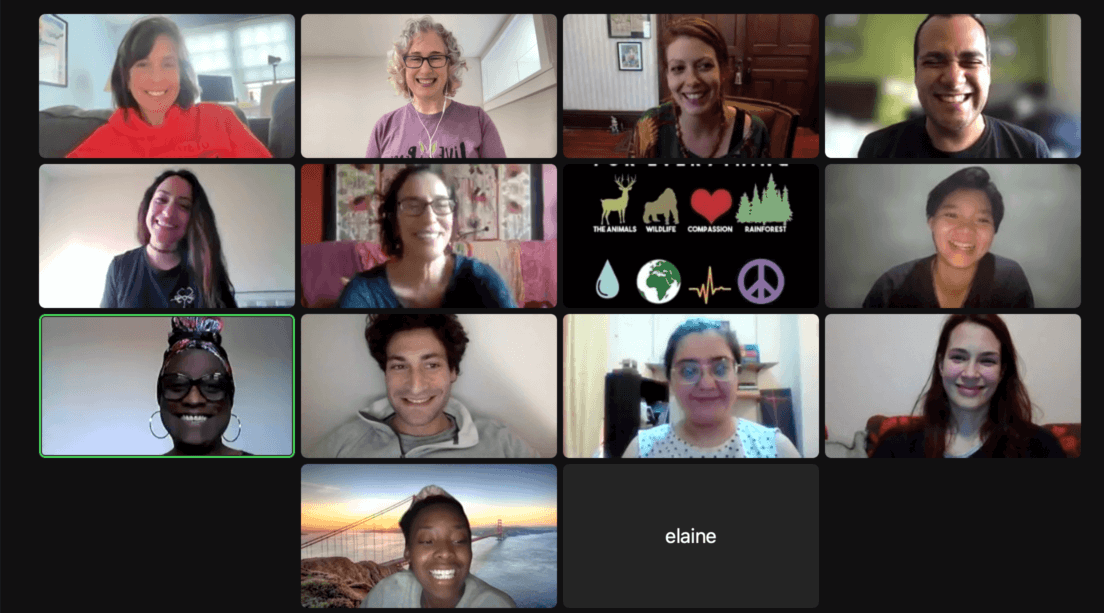
Peace Advocacy Network (PAN) is a grassroots group that strives for the absence of violence in the lives of people and animals by eliminating oppression and inequity. To promote a movement led by healthy, informed activists, they offer the Vegan Activist Academy: a free online training program that educates participants on various advocacy skills and certifies them as vegan activists.
“We empower activists to explore and discover the forms of activism that best suits them, while providing tools and skill sets to support them on their journey,” said Mohamed Seyam, PAN’s Activist Training Director.
During the course, participants work toward creating individual activist plans that they can implement in their communities after completing the program. Each week covers a new topic that supports them in that goal, such as effective communication, fundraising, campaign strategy, coalition building, and inclusivity training. Special guest speakers also visit the class to share their expertise on the weekly topic.
“After the completion of the program, activists also have access to additional training and support from PAN,” said Seyam. “We’re excited to see the evolution of creativity and passion within the movement!”
Applications for Vegan Activist Academy are currently closed. For now, interested activists can read the 2022 summary report for details on the program’s outcomes and future and keep an eye on PAN’s website and social media for updates on the next session.
Viral Vegans: Fostering a Connected Community
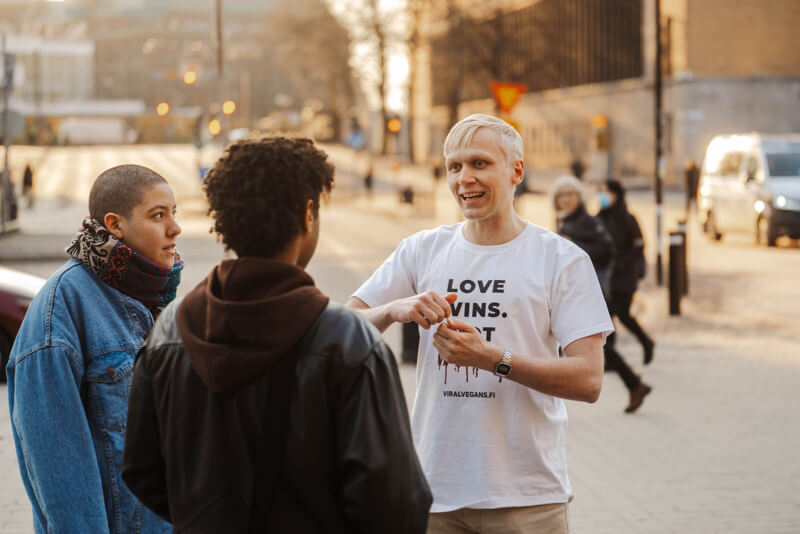
Viral Vegans is a new, volunteer-led organization focused on building the farmed animal advocacy movement in Finland, particularly among younger people. They aim to eliminate large-scale animal abuse by raising awareness of conditions on factory farms and promoting an end to the production of animal products.
“Viral Vegans has succeeded [in tapping] into the minds of teens who have previously not been that active or interested in animal rights or veganism,” said the group’s cofounder, Pavel Tcherenkov. “We’ve become a media house by creating interesting, engaging, and fast-paced content suited for both [the] younger generation and adults.”
The group’s efforts include hosting a Finnish-language vegan podcast (Vegaaneista tykkään), holding school presentations, engaging in street activism, and marketing to support businesses and messages that align with their cause.
According to Tcherenkov, Viral Vegans visited over 20 schools in 2022 and reached hundreds of thousands through their digital content. Their volunteers’ years of experience in marketing, graphic design, and videography have helped them connect with Finnish people seeking a vegan community.
“By providing both online and physical events, we want to ensure that no vegan has to feel lonely in the future,” said Tcherenkov.
Viral Vegans is currently recruiting Finland-based volunteers for content production, street activism, website development, illustration or graphic design, video and audio editing, and marketing. Submit a volunteer interest form to apply.
Animal Ask: Optimizing Animal Welfare Asks
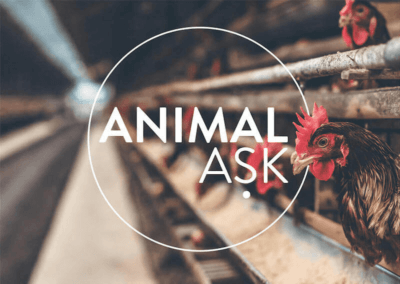
How a charity chooses to spend its limited resources plays a key role in determining its overall effectiveness. Animal Ask helps organizations optimize their efforts by supporting them with in-depth, cross-comparative research about the most promising ways to help animals.
“The support we have provided groups has tended to fall into one of two areas,” said George Bridgwater, Cofounder and Head of Research at Animal Ask.
The first of these is prioritization research. According to Bridgwater, this process includes idea generation and comprehensive research on potential campaign ideas, as well as constructing theories of change for different interventions, reviewing available evidence on expected effects, examining flow-through effects, and assessing outcomes across different moral perspectives.
Animal Ask’s second common area of support involves the production of ‘white papers’ to support campaigns, “as groups either lack the capacity or background to synthesize research on a topic.”
Depending on an organization’s needs, Animal Ask will recommend its prioritization or consultation services. Although the latter is less rigorous than the former, it still serves to help organizations identify campaign priorities and determine their optimal ask.
Organizations interested in Animal Ask’s prioritization and consultation services must first fill out an expression of interest form. Organizations are also welcome to use Animal Ask’s research database and ask development framework for assistance in their strategic decision making.
Animal Advocacy Africa: Capacity Building for Animal Advocacy
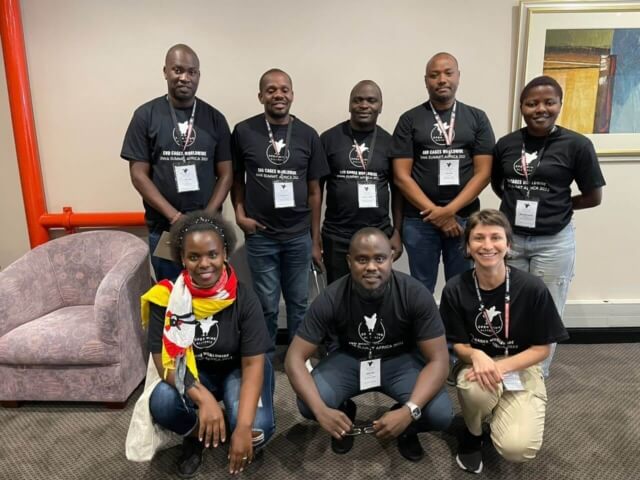
Animal suffering occurs globally, yet funding for animal advocacy efforts can be difficult to secure in regions where the movement is less established. Animal Advocacy Africa (AAA) aims to attract more funding to the African animal advocacy space by assisting organizations with fundraising and capacity building.
“The animal advocacy movement is still in its infancy in Africa, though a tipping point for adverse negative effects of farmed animal welfare associated with intensive farming is on the verge of happening,” said Sopani Neba, AAA’s Programs Manager. “There are many animal advocates in Africa that are aware of and eager to reduce animal suffering but might lack the capacity and resources to achieve their advocacy goals.”
To better understand the bottlenecks and opportunities of farmed animal advocacy in Africa, AAA conducted exploratory research on the landscape of the movement, priority areas, and the effectiveness of various interventions. Their findings inform their capacity-building program to support the needs of African animal advocacy groups, which tend to fall into two categories: (i) understanding how to run effective animal advocacy organizations that can yield high-impact results and (ii) securing funding.
“Advocates may lack the capacity, knowledge, and feedback required to determine cost-effective interventions that can help the most animals and create strategic plans to implement and measure the progress of impact-oriented solutions. Similarly, advocates may lack expertise in organizational areas such as operations management and communications. [They may also] lack access to a large amount and variety of funding opportunities to support the work they are doing both at the early stage and growth stage,” Neba told ACE.
As of 2022, AAA has assisted 17 organizations with fundraising, implementing high-impact strategies, and networking with influential figures in the effective altruism and animal advocacy movements. They plan to continue this movement building work in 2023.
Animal Charity Evaluators (ACE) seeks to identify and promote the most effective strategies to reduce animal suffering. Based on available research, ACE currently prioritizes interventions focused on influencing large-scale systems and social norms than those that aim to affect change at the personal level.
Filed Under: Strategy Tagged With: interventions, Menu of outcomes series
About Selena Darlim
Selena joined ACE in September 2021. She is a longtime animal advocate with several years’ experience writing for nonprofits and media organizations. She holds a self-designed bachelor’s degree in Wildlife Conservation and Animal Advocacy, and she strives to continually expand her knowledge of human and nonhuman advocacy movements.